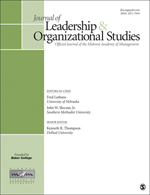Is Your Supervisor Abusive?
When bosses humiliate, yell at, or otherwise bully subordinates, the consequences are unavoidable: abusive supervision can cause serious problems that extend from the individual to the organization as a whole. But when employees perceive that they are being abused, is it always the case, or can other factors color their perception?
Mark Martinko of the University of Queensland recently joined Ken Thompson on the Journal of Leadership & Organizational Studies podcast to discuss his article, “The Relationships Between Attribution Styles, LMX, and Perceptions of Abusive Supervision,” co-authored by David Sikora of Cal Poly San Luis Obispo and Paul Harvey of the University of New Hampshire and published in the November 2012 issue of JLOS. Click here to play or download the podcast interview or subscribe on iTunes by following this link.

Dr. Mark Martinko
Florida State University
Mark J. Martinko (Ph.D.) recently joined the faculty of the University of Queensland. He is a Professor Emeritus at Florida State University where he was the Bank of America Professor of Management. He teaches in the areas of leadership, organizational behavior, philosophy of science, and attribution theory. His research focuses on attribution theory which he has applied to the areas of motivation, leadership, impression management, whistleblowing, emotions, organizational deviance, abusive supervision, and entitlement. He is a past president of the Southern Management Association and former Division Chair of the Managerial and Organizational Cognition Division of the Academy of Management. Currently he is the Dean of the Fellows of the Southern Management Association.

Dr. Ken Thompson
DePaul University
Ken Thompson, Ph.D., is professor and the former chair of management at DePaul University, where he has been on staff since 1986. He has co-authored four books, contributed to six others, and has been published in a number of journals including the Academy of Management Executive, Organizational Dynamics, Journal of Social Psychology, Human Relations, and the Journal of Leadership and Organizational Studies, where he is senior editor. Ken is a member of the National Academy of Management. Most recently, he was chair of the Management Education and Development Division and served on the governance board of the Organizational Behavior Division. Ken has also been active in various local and regional positions, including president and chairman of the Board of Directors of the Midwest Academy of Management.






















































































